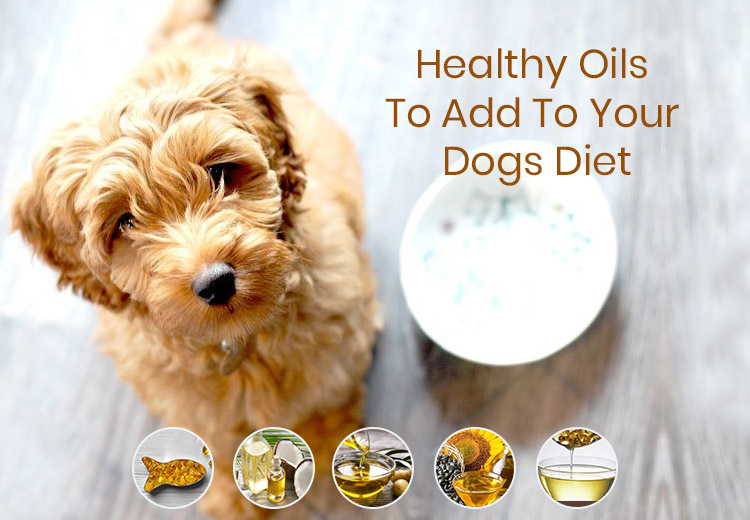Healthy Oils To Add To Your Dogs Diet

All parents out there would want their pets to be healthy and happy all times. One way to achieve this goal is to make sure that the pet gets the required nutrition from whatever they eat. Some pets do not like certain foods, or they may have allergies to some foods. Moreover, some pets may not completely absorb the vital nutrients such as fatty acids and that is when your pet does not get the complete nutrition.
One of the crucial nutrition supplement all dogs and cats need is fatty acids, and they are famously known as ‘Essential Fatty Acids’. They are impossible to reproduce from non-fat sources like protein or carbohydrate but needs to be provided in the form of a diet.
There are two types of fats saturated and unsaturated fats. Unsaturated fats are known to be the good fats, and mostly found in plant-based foods such as nuts, seeds and oils. Oils are the easiest ways to add nutrients to your pet’s diet because oils are somewhat distinct in food.
Here is the list of a few essential oils that can be used to add further nutrition to your pet’s daily diet!
FISH OIL
Fish oil contains two essential omega 3 fatty acids eicosapentaenoic acid (EPA) and docosahexaenoic acid (DHA). Dogs specifically need EPA and DHA to decrease inflammation due to arthritis. Fish oil is the most potential source of EPA and DHA. You can provide it by feeding a prescription food that contains high levels of fish oil such as fish oil supplements or whole fish.
Fish oil supplements are available in the form of soft gel capsules and oral liquid solutions. Before dosing your pet with, it is necessary to consider the amount of omega3 fatty acids they are already taking in their regular food because an over dose can cause anticoagulation and gastric problems. The average dose for a dog is 1000 mg for every 30 pounds of body weight and for cats, it is about 30 mg per pound. It is recommended to consult a veterinarian for the best suitable dose for your pets.
Fish oils protect the heart by acting as an anti-coagulant and prevent heart disease. It also helps improve skin coats, especially in allergy pets. Fish oils help improve neurologic development and cognitive function. It also provides relief in joint pains.
COCONUT OIL
Coconut oil has antibacterial and antiviral properties that can help heal cuts and wounds. Coconut oil’s medium-chain triglycerides have long-lasting improved cognition effects on aging dogs. They boost brain function by providing it with energy in the form of ketones. It also helps keep your dog’s coat soft and shiny. In dogs, Coconut oil improves digestion and helps relieve the symptoms of colitis and other inflammatory bowel disorders. The standard recommended dose is 1 teaspoon per 10 pounds of body weight.
OLIVE OIL
Olive oil is derived from the flesh of olives. There are various types of olive oils, out of which Virgin/ Extra-Virgin oils have the most nutrients.
Olive oil has high levels of antioxidants that stimulate the immune system. Olive oil for dogs prevents free radical cell oxidation that can lead to premature aging. Olive oil for dogs pushes the weight-loss procedure by breaking down the fat inside fat cells, getting rid of belly fat and reducing insulin sensitivity. It also prevents and reduces the risk of heart disease and sugar related disorders.
SUNFLOWER OIL
Sunflower oil contains the right amount of omega-6 fatty acids required for your pet’s diet. It also has lower saturated fat compared to animal fat. It should be used with food cooked at home. Generally, a medium dog can take up to one teaspoon a day; that sums up to about 8 gm omega 6.
Sunflower oil in dogs help keep the skin moisturized, hence maintains a healthy coat and skin. It also promotes energy, healthy immune function, heart health, and normal organ function.
COD LIVER OIL
Cod liver oil is a type of fish oil that is derived from the livers of cod fish. It contains a high amount of omega-3 fatty acids along with vitamin A and vitamin D. It is added in the dog’s diet when there is an inflammatory situation is diagnosed such as hepatitis, arthritis, etc. Cod liver oil is available in both liquid and capsule forms. Overdose of Cod liver oils may result in nausea, vomiting, diarrhea, etc.
There are enough options available that can confuse any pet lover to make up their mind on which edible oil to go with. So it will not be a bad idea to consult your veterinarian before adding any edible oil to your pet’s diet.
